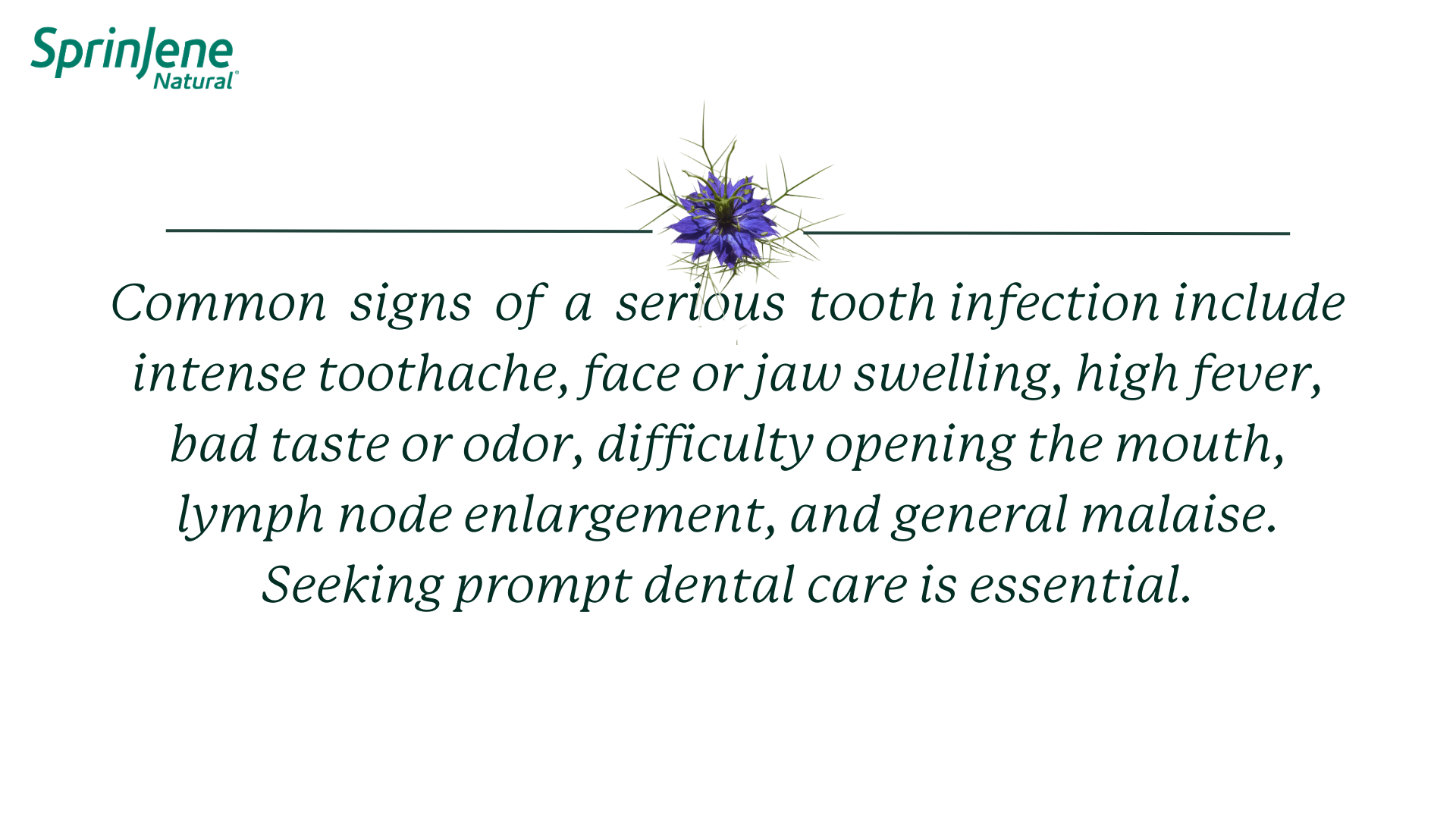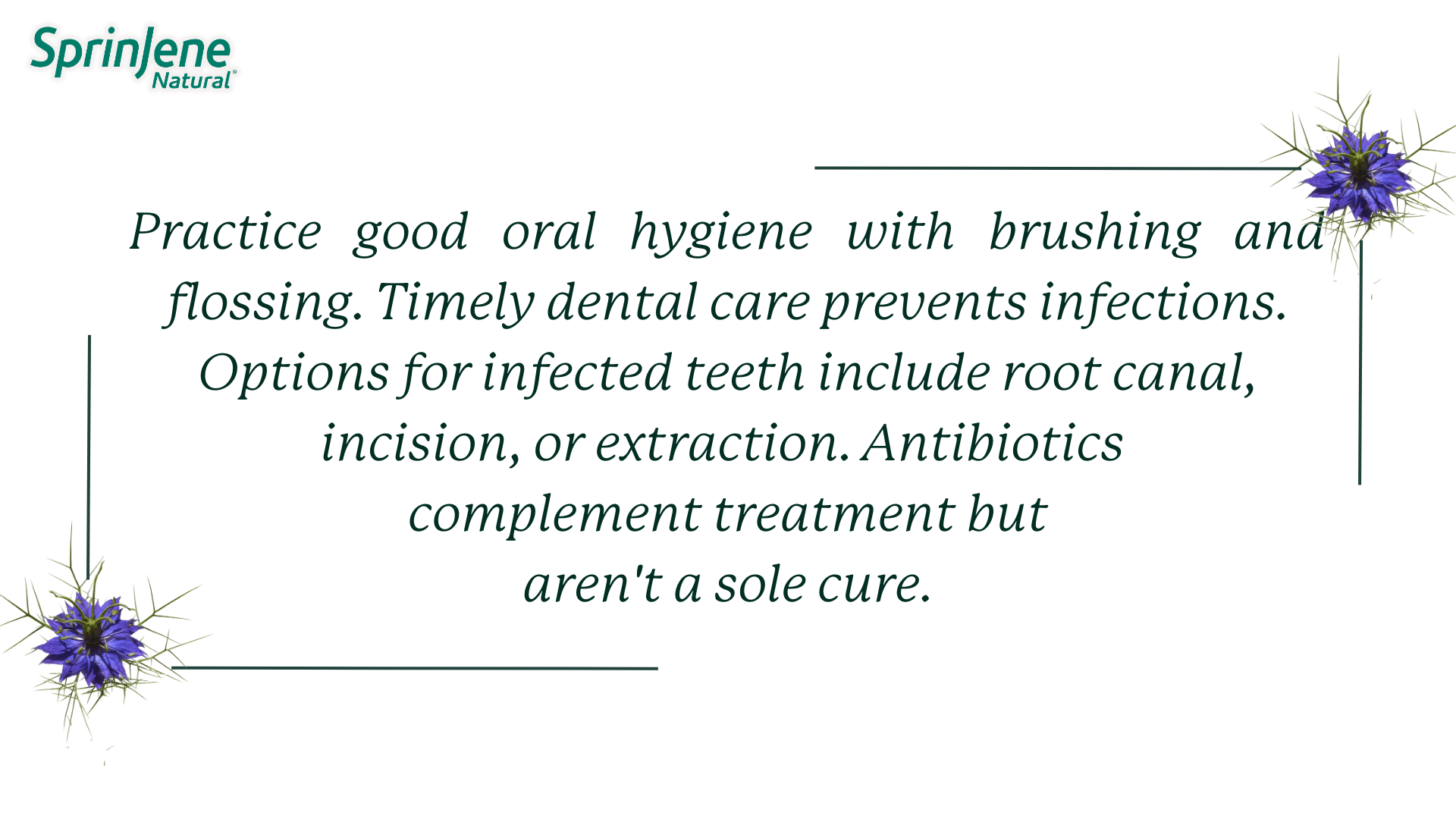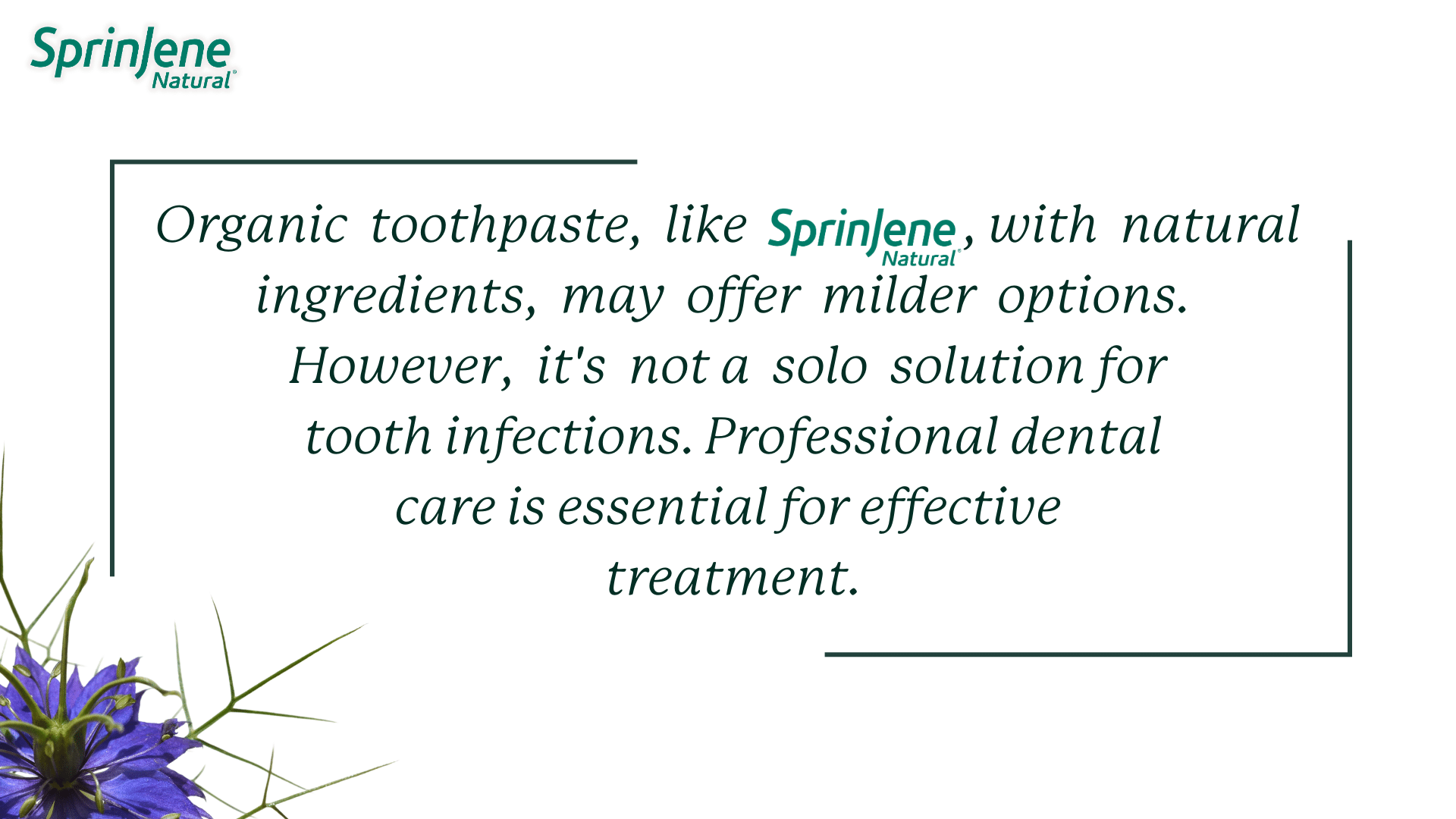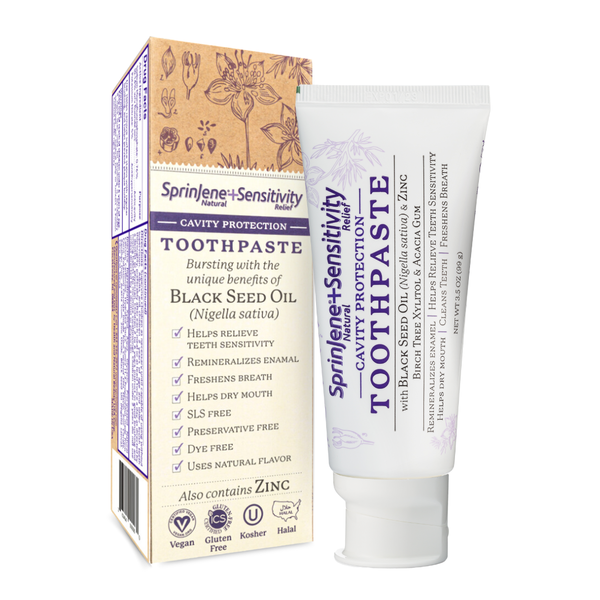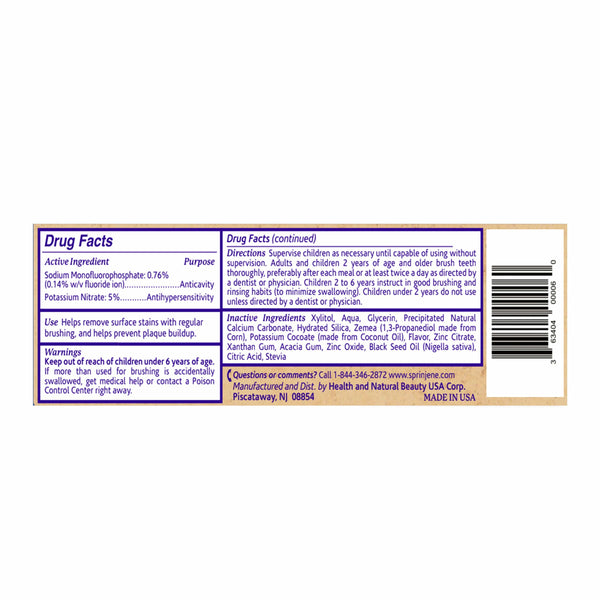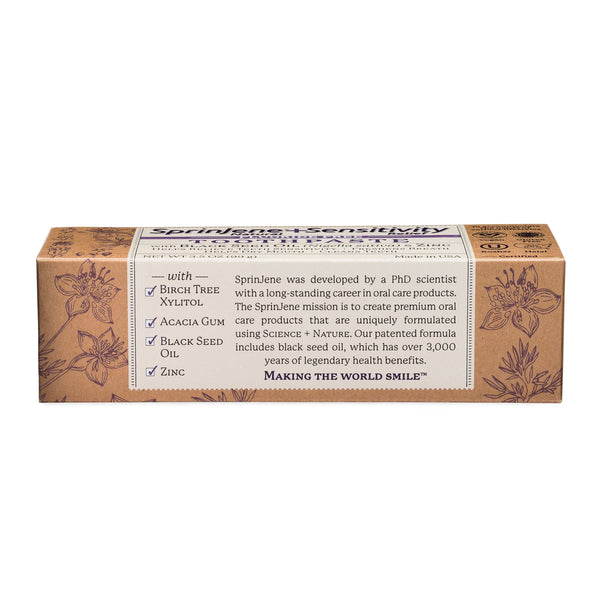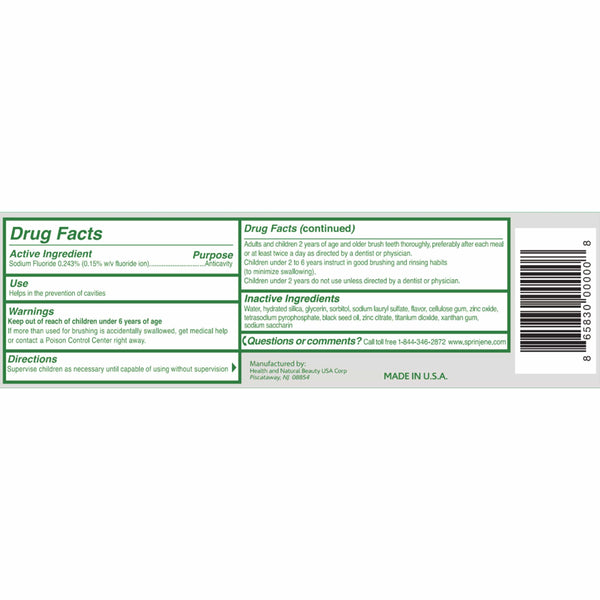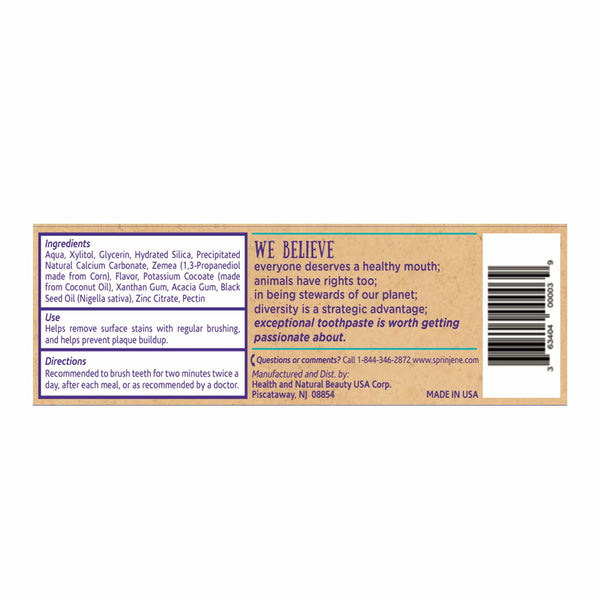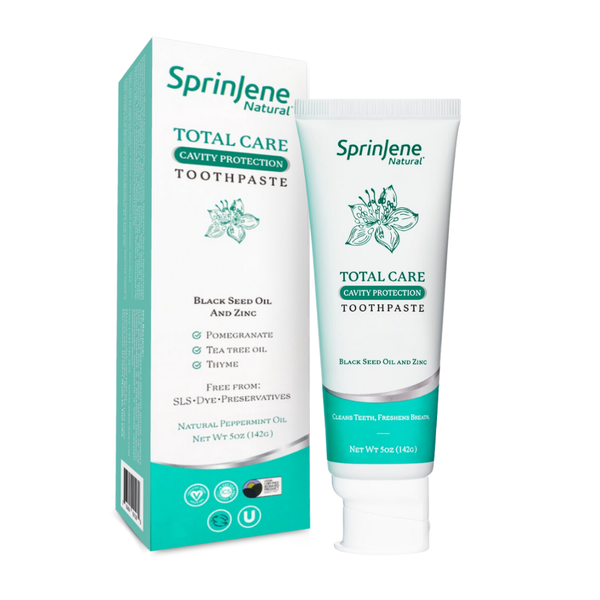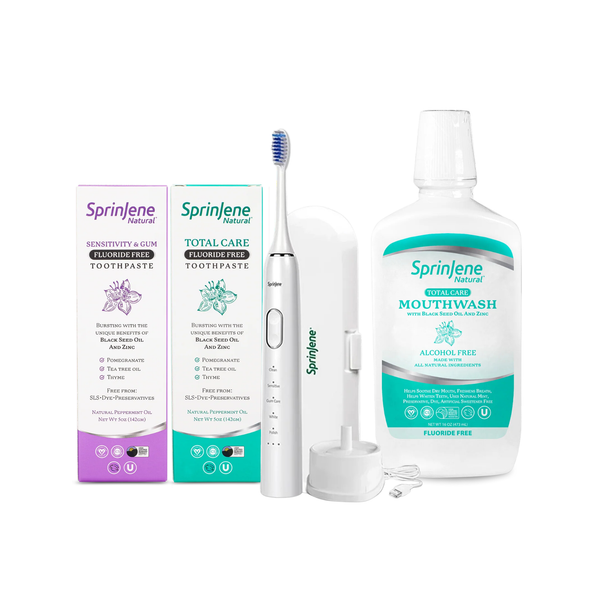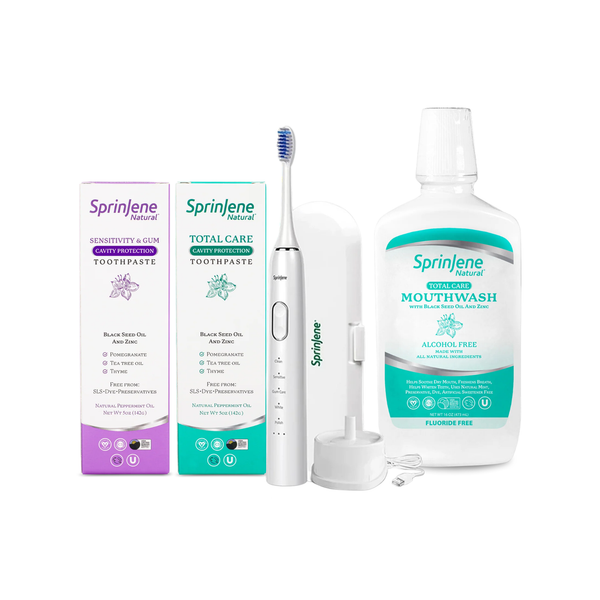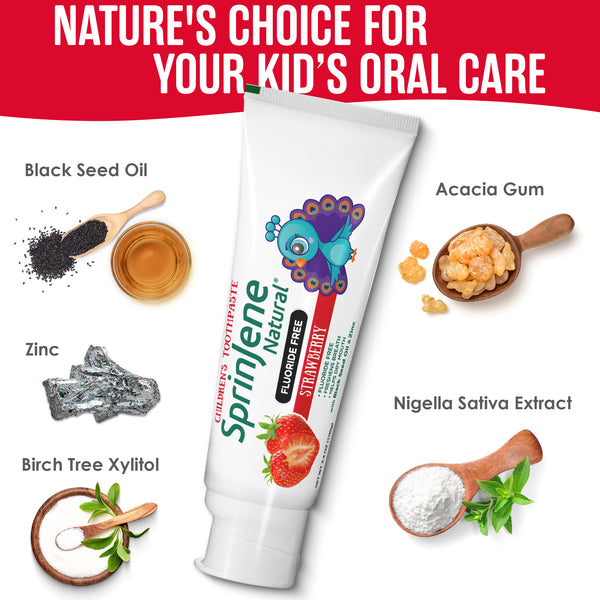Tooth or dental abscesses[1] are painful issues caused by bacteria invading the tooth or the nearby tissues. Even though these issues mostly affect the mouth, some folks are concerned about the possibility of these infections spreading to other parts of the body. This article delves into whether tooth infections can spread and what kind of impact they might have on your overall health.
Signs and Symptoms of A Serious Tooth Infection
-
Severe Toothache:
A persistent and intense toothache is a hallmark symptom of a tooth infection. The pain may be throbbing, sharp, or constant, and it can radiate to the jaw, ear, or head.
-
Swelling:
Swelling of the face, jaw, or neck is a common sign of a severe tooth infection. The area around the infected tooth may become visibly swollen and tender to the touch.
-
High Fever:
Sometimes, a tooth infection can lead to a fever. If you find your body temperature rising (above 100.4°F or 38°C) along with other symptoms, it might signal a more severe infection.
-
Bad Taste or Odor:
If you notice an unpleasant taste or smell lingering in your mouth, even after brushing, it could be an indication of a tooth infection. This may occur because of the presence of pus or bacteria linked to the infection.
-
Difficulty Opening the Mouth or Swallowing:
Swelling and inflammation caused by a tooth infection can make it challenging to open the mouth fully or swallow comfortably.
-
Lymph Node Enlargement:
The lymph nodes near the infected area, particularly in the neck and under the jaw, may become swollen and tender.
-
General Malaise:
A tooth infection can make you feel generally unwell. You may experience fatigue, weakness, or a sense of being sick.
Recognizing that not all tooth infections present with the same symptoms, and the severity of these symptoms can vary, is crucial. However, if you experience any combination of these symptoms, it is vital to seek dental care promptly.
Understanding Tooth Infections
Tooth infections typically occur when bacteria invade the tooth's innermost layers, known as the pulp, through dental decay, cracks, or fractures. As the infection progresses, a dental abscess, a pus collection, may form at the tooth's root or surrounding gum tissues. Common symptoms of a tooth infection include severe toothache, sensitivity to hot or cold, swollen gums, facial swelling, and foul taste or odor.
Local Complications of Tooth Infections
-
Spread of Infection to Adjacent Tissues:
The infection can spread from the tooth's root to the surrounding gum tissues, leading to a periodontal abscess. This can result in gum swelling, pain, and the formation of a painful gum boil.
-
Development of a Dental Fistula:
Occasionally, a dental abscess can create a drainage path outside the mouth, forming a dental fistula or a gum boil. This is a small channel through which pus drains, relieving pressure and reducing pain. However, to prevent further complications, we must still treat the underlying infection.
-
Bone Infection (Osteomyelitis):
In rare cases, a tooth infection can extend to the jawbone, resulting in a condition known as osteomyelitis. This condition may bring about bone loss, ongoing pain, and challenges in moving the jaw.
Systemic Consequences of Tooth Infections
While tooth infections primarily affect the local area, there is a concern that the infection can spread to other body parts[2] through the bloodstream or the lymphatic system. Although rare, potential systemic consequences of untreated tooth infections include:
-
Bacteremia:
In certain situations, bacteria from a tooth infection may enter the bloodstream during activities that induce bleeding in the mouth, like brushing, flossing, or dental procedures. This can result in transient bacteremia, where bacteria travel throughout the body. However, individuals in good health with a well-functioning immune system typically manage to eliminate the bacteria without significant consequences.
-
Endocarditis:
Individuals with pre-existing heart conditions, such as abnormalities in heart valves or artificial heart valves, may be at an elevated risk of developing endocarditis. This is a severe condition where bacteria from an infected tooth can attach to the heart valves, causing inflammation and potentially damaging the valves. Immediate medical attention is necessary for this condition.
-
Septicemia:
While exceptionally uncommon, in instances of severe untreated dental infections or rapid spread, a critical condition known as septicemia or blood poisoning can arise. This happens when bacteria overpower the immune system, resulting in a systemic infection that can be life-threatening if not addressed promptly. If you suspect an infection is spreading, it is imperative to contact a dentist immediately.
Prevention and Treatment: Safeguarding Your Oral Health
Ensuring proper oral hygiene is crucial to minimize the risk of systemic complications associated with tooth infections. Achieving this involves consistent practices such as regular brushing, flossing, and scheduling routine dental check-ups. Prompt treatment of dental decay, fractures, or other dental issues can prevent the development of infections.
In cases of tooth infections, seeking dental care is crucial. Dentists can evaluate the extent of the infection, provide appropriate treatment, and prescribe antibiotics if necessary. Treatment options for tooth infections typically involve:
-
Root Canal Treatment:
This procedure involves removing the infected pulp from the tooth, cleaning the root canals, and sealing them to prevent further infection. Root canal treatment can save the tooth from extraction while eliminating the source of the infection.
-
Incision and Drainage:
Consider this scenario: if you are currently dealing with a dental abscess, the dentist may need to undertake a decisive course of action. Employing a procedure involving an incision in the abscess to facilitate the drainage of pus and alleviate pain serves as a means of providing relief to the abscess. After this daring move, there's usually more treatment action to tackle the real reason behind the infection. Dentists are consistently contributing to resolving issues, one abscess at a time!
-
Extraction:
Extraction might become necessary if the tooth is significantly damaged or the infection has spread extensively. This procedure aims to remove the source of the infection, preventing its further spread to other parts of the body.
Doctors may prescribe antibiotics alongside these treatments to help control the infection. However, using antibiotics alone is insufficient to cure a tooth infection and one should use them with appropriate dental interventions.
Can A Tooth Infection Spread To The Brain?
Hey, check it out – sometimes, if your tooth gets all infected, it might decide to take a crazy journey up to your brain, causing this serious thing called a brain abscess. An uncommon journey, but not of the enjoyable variety. Treating the matter seriously and promptly consult a healthcare professional is important.
So, here's the deal – the infection from your tooth can travel to your brain using these paths called "fascial spaces" or sneak into nearby areas like sinuses, jawbone, or your face. The bacteria from the tooth trouble can hitch a ride through your blood vessels or nerves and end up in your brain, making a not-so-cool abscess. In conclusion, if you are experiencing any disturbance or discomfort with your tooth, it is advisable not to delay seeking professional medical attention. Schedule an appointment with a healthcare provider promptly.
A brain abscess is a localized collection of pus within the brain tissue. Symptoms of a tooth infection spreading to the brain include severe headache, fever, neck stiffness, changes in mental status, neurological deficits, and seizures. Timely diagnosis and treatment are crucial to prevent further complications and potential neurological damage.
If you suspect a spread of infection from a tooth, experiencing symptoms like a severe headache or neurological changes, seeking immediate medical attention is vital. A healthcare professional will assess your condition, may order imaging tests, and provide suitable treatment, which could involve a combination of antibiotics, abscess drainage, and supportive care.
While the possibility of a tooth infection reaching the brain exists, it is a rare occurrence. Prompt dental care and appropriate treatment can significantly minimize the risk of such complications.
Benefits Of Using Organic Toothpaste Against Tooth Infections
So, manufacturers typically craft organic toothpaste from plant-based ingredients, essential oils, and other natural substances. But here's the catch – it might not be the superhero for treating tooth infections on its own.
Now, tooth infections, fancy name dental abscesses, happen when sneaky bacteria get deep into your tooth's core, called the pulp. Blame tooth decay, a cracked tooth, or gum disease for letting those bacteria crash the party. Just know, organic toothpaste is awesome for many things, but battling tooth infections might need some extra help.
In the case of a tooth infection, prompt dental attention is vital. Dentists will assess the infection's extent and recommend suitable treatment. Typically, managing a tooth infection involves draining the abscess and removing the infection source, potentially through a root canal or tooth extraction in severe cases. Dentists might also prescribe antibiotics to control the infection.
While organic toothpaste offers advantages for daily oral hygiene and preventing tooth decay[3], one should not consider it as a standalone treatment for tooth infections. Professional dental care is essential to prevent complications and ensure proper healing.
SprinJene Natural toothpaste stands out as a brand free from potentially harmful substances like sodium lauryl sulfate (SLS) and artificial preservatives. While contributing to overall oral hygiene, it's crucial to recognize that professional dental treatment is necessary for tooth infections, such as dental abscesses, and they cannot be solely addressed with toothpaste.
Using a natural toothpaste like SprinJene may have some advantages to maintaining oral health and potentially preventing tooth decay, which can be a contributing factor to tooth infections. Here are a few potential benefits of using SprinJene Natural toothpaste:
-
Mild and Gentle:
Some natural toothpaste formulations may be milder and less abrasive compared to conventional toothpaste, which can be beneficial for individuals with sensitive teeth or gums.
-
Natural Ingredients:
So, this SprinJene Natural toothpaste? It has cool stuff like coconut oil, birch tree xylitol, black seed oil, and acacia gum. It seems like a gathering of natural elements, doesn't it?Moreover, these components may confer additional benefits to your oral health, such as possessing antibacterial or anti-inflammatory properties. We still need more research to figure out exactly how much of a superhero these ingredients are for your oral health.
-
Free from Certain Chemicals:
SprinJene Natural toothpaste is free from potentially harmful substances like SLS and artificial preservatives. Some individuals may prefer toothpaste without these ingredients because of personal preferences or sensitivities.
While using SprinJene Natural toothpaste may contribute to overall oral health, it's important to emphasize that toothpaste alone cannot effectively treat tooth infections. Seeking professional dental care from a dentist if you suspect a tooth infection is crucial. A dentist will evaluate the condition and provide appropriate treatment to address the underlying infection.
The Nexus Between Oral Health and Overall Well-being
Avoiding tooth infections requires adhering to proper oral hygiene practices and promptly seeking dental care to minimize the risk of systemic complications. Dental professionals play a crucial role in assessing and treating tooth infections, employing techniques like root canal treatment, incision, drainage, or extraction based on the infection's severity.
In case you suspect a tooth infection, seeking dental care promptly is vital to prevent further complications. Regular dental check-ups and maintaining good oral hygiene practices are essential for overall oral health, reducing the likelihood of tooth infections spreading to other parts of the body.
References:
- Sanders, J. & Houck, R. (2023). Dental Abscess. PubMed. PMID: 29630201
- Erazo, D. & Whetstone, D. (2022). Dental Infectons. National Library of Medicine. PMID: 31194322
- Karadağlıoğlu, O., Ulusoy, N., Başer, K., Hanoğlu, A., & Şık, I (2019). Antibacterial Activities of Herbal Toothpastes Combined with Essential Oils against Streptococcus mutans.National Library of Medicine. doi: 10.3390/pathogens8010020


